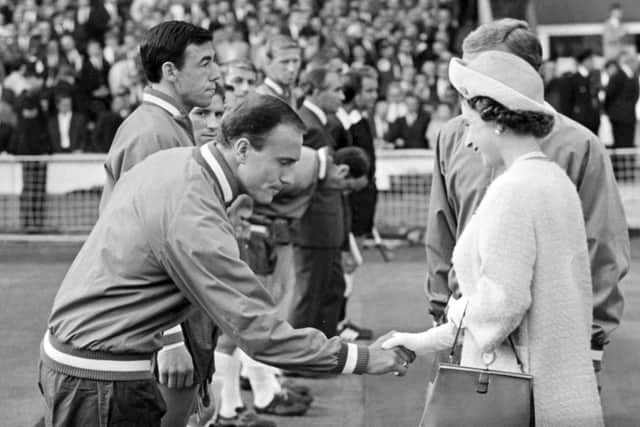World Cup winner George Cohen fought battles on and off the pitch
and live on Freeview channel 276
Cohen played every match of the finals on home soil, having stepped into Sir Alf Ramsey’s team following an injury to regular right-back Jimmy Armfield.
His death means there are now only two survivors from the starting XI for the 4-2 final victory over West Germany – Hurst and Sir Bobby Charlton, who is living with dementia.
Advertisement
Hide AdAdvertisement
Hide AdHurst, whose hat-trick in that match proved decisive, wrote on Twitter: “Very sad to hear my friend and England team-mate George Cohen has died.


“Everyone, without exception, always said that George was such a lovely man. He will be sadly missed, my heartfelt thoughts are with George’s wife Daphne and his family.”
Cohen’s death was first announced by Fulham, the club where he spent his entire professional career between 1956 and 1969. His playing days were cut short by a knee injury at the age of 29.
In 2016 the club commissioned a statue of Cohen to mark the 50th anniversary of the 1966 success.
Advertisement
Hide AdAdvertisement
Hide AdCohen said at the time: “I find it absolutely wonderful that they even thought I was worthy of (a statue). Especially as it was alongside Johnny Haynes, the greatest name in Fulham’s history."
Cohen may have collected only one trophy during his playing career, but a winners' medal from the 1966 World Cup final secured the defender a place in English football history.
Just as useful an asset in supporting the attack on the overlap as he was tracking back, it was no surprise to see Ramsey turn to the dependable Cohen when a knee problem ruled out Blackpool's Armfield, who had gained wide acclaim for his performances as England reached the quarter-finals of the 1962 World Cup in Chile, where they lost to eventually champions Brazil.
Cohen made his England debut at right-back in a victory against Uruguay in May 1964. Just over two years later, he would be celebrating the game's greatest prize.
Advertisement
Hide AdAdvertisement
Hide AdBorn in Kensington, London, on October 22, 1939, his father, who was a gas fitter, had urged the young Cohen to "use his brains" rather than press on with his love of boxing and so, after considering a career as an electrician, eventually he joined Fulham, the team he supported, aged 17 with a monthly wage of £28.
Cohen would go on to play more than 450 games for the west London club, whom he helped win promotion to the top flight in 1958-59, until he was forced into early retirement aged 29 through a knee injury, going on to embark on a career in property development.
His 37th and last appearance for England came in November 1967, a 2-0 victory over Northern Ireland at Wembley.
In 2000, he received an MBE along with four other members of the World Cup-winning XI who had yet to be honoured.
Advertisement
Hide AdAdvertisement
Hide AdLife after football, though, was to prove just as tough a battle as shackling the game's most tricky wingers had been on the pitch for the man once described by George Best as the finest full-back he had ever taken on.
Aged just 36, Cohen was diagnosed with bowel cancer, having been left feeling exhausted after going out running near his Tunbridge Wells home.
"My world was turned upside down. This can't be happening to me - I am George Cohen, England footballer, athlete, indestructible. I was a world champion and I was still very fit," he recalled in his autobiography. "One day I felt invincible and the next the doctors put me in a side room at the Royal Marsden for people who weren't going to make it and started talking about getting my affairs in order.
"(My wife) Daphne told the doctors, 'We're not getting his affairs in order, because he's not going anywhere'."
Advertisement
Hide AdAdvertisement
Hide AdSlowly, the Cohen family looked towards a recovery, only for the disease to resurface just 18 months later, which this time required a colonoscopy and left them once again facing an uncertain future. More health issues would follow, with Cohen needing specialist chemotherapy and radiotherapy on an inoperable tumour in his back.
Eventually, Cohen, who, like many of his old team-mates, later decided to sell his World Cup medal to help provide financial security for his family, was given the all-clear in 1990.
Only three years later, World Cup-winning captain Bobby Moore died of the disease aged 51. Cohen continued to work as an active patron for the Bobby Moore Fund.
There were also family bereavements to overcome, Cohen's father having died of lung cancer and, in 1971, his mother killed when she was run over by a juggernaut.
Advertisement
Hide AdAdvertisement
Hide AdHis brother Peter, father to England rugby player and 2003 World Cup winner Ben, died from head injuries after being attacked when trying to break up a fight outside a Northampton nightclub in October 2000.
The former defender remained a regular at his beloved Craven Cottage. He acted as a matchday host in the George Cohen Restaurant, while his World Cup medal now hangs proudly in Fulham's trophy room and outside he has been immortalised in a statue which was unveiled in 2016 to mark half a century since England's triumph.
Cohen is survived by wife Daphne, whom he married in 1962, and sons Andrew and Anthony.